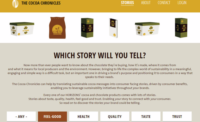Barry Callebaut collaborates with Japanese chocolate industry on sustainable cocoa
Morinaga, Yuraku Confectionery, FamilyMart Co., Ltd., G+ Spread, Le Chocolat De H, Chocolate Design and J.Maeda and others are working with Barry Callebaut on the initiative.

The Barry Callebaut Group is collaborating with Japanese chocolate manufacturers, artisans, retailers and wholesalers to make sustainable chocolate the norm for the Japanese market.
Some of the companies Barry Callebaut is working with include: Morinaga, Yuraku Confectionery, FamilyMart Co., Ltd., G+ Spread, Le Chocolat De H, Chocolate Design and J.Maeda.
Consumer insights research conducted by Barry Callebaut in 2019 revealed that more than 70 percent of Japanese consumers believe that sustainable chocolate products are more trustworthy, of better quality and in alignment with their values.
In fact, 75 percent of Japanese consumers linked the purchase of sustainable chocolate products with a feel-good factor and more than 50 percent indicated they would buy sustainable chocolate in the future.
Since the global launch of Forever Chocolate, its plan to make sustainable chocolate the norm by 2025, Barry Callebaut has persistently pushed for systemic change to the cocoa and chocolate value chain worldwide and in Japan over the past few years.
Among various efforts, the company has consistently championed for companies to be purpose-driven and to put sustainability at the heart of their business strategy. It has also led the introduction of Cocoa Horizons, one of its key sustainability programs, as an effective avenue for customers, as well as the mentioned above, to contribute directly to sustainability efforts in origin countries.
Increased focus on sustainability amid COVID-19 pandemic
With the long-term shift toward sustainable chocolate because of its positive effects on economic, social and environmental change, several chocolate manufacturers in Japan have reaffirmed their commitment to produce sustainable chocolate even during the COVID-19 pandemic.
In March this year, Yuraku Confectionery pioneered this move by announcing its transition to 100 percent sustainable chocolate in all its highly popular Black Thunder chocolate bars by 2025.
In the coming weeks, Morinaga, will also introduce sustainable chocolate products that will be widely available in grocery shops and retailers across Japan.
“With escalating global awareness around environmental issues, as witnessed at the Davos Conference and the Australian wildfires, we were considering how we, as a manufacturer of chocolate, should tackle these issues through our business,” said Machiko Miyai, director and managing executive officer of Morinaga in Japan. “At such a time, Barry Callebaut introduced the Cocoa Horizons program as a way for us to make chocolate that is good for the people who eat it, good for the people who make it, and good for the planet. So we decided to start using Cocoa Horizons cacao as the environmentally friendly source.”
Businesses and consumers are going back to the source
COVID-19-related disruptions, such as the impact on the livelihoods of cocoa farmers in Africa and Indonesia, have also brought focused attention on the preference of businesses to understand the source of their products. Hence, more chocolate manufacturers, artisans and retailers are turning to sustainability programs like Cocoa Horizons as it is the most direct and effective way to improve the livelihoods of cocoa farmers, eradicate child labor and protect nature.
Barry Callebaut’s artisan customers such as Le Chocolat De H have long paved the way for sustainable chocolate through the company’s Gourmet product offerings. Under the finest Belgian chocolate brand Callebaut, cocoa can now be traced back to the Cocoa Horizons farming communities in Ghana, Ivory Coast and Ecuador.
“I believe the ‘farm to bar’ approach is the basis for improving the quality of our creations,” said Hironobu Tsujiguchi, chocolatier from Le Chocolat De H. “We need to tell consumers that a good tasting product begins with the growth and fermentation of raw materials at origin countries. Therefore it is important to be aware of where these ingredients come from and to find added value for the farm and the store.”
Consumers too, particularly of Generation Z, are increasingly integrating their social and environmental concerns into their buying decisions. These consumers are mindful of their purchases and want to make social and ethical contributions through their everyday life.
“Our bold mission is to change the entire chocolate industry in Japan,” said Pascale Meulemeester, managing director for Barry Callebaut in Japan. “We cannot do this alone, and we are not alone. The new Japanese consumers care deeply about our planet and its people, and today, as we stand together to represent the chocolate industry in Japan, we are serious about sustainability. Together we will leave a legacy of change for generations to come.”
Looking for a reprint of this article?
From high-res PDFs to custom plaques, order your copy today!






